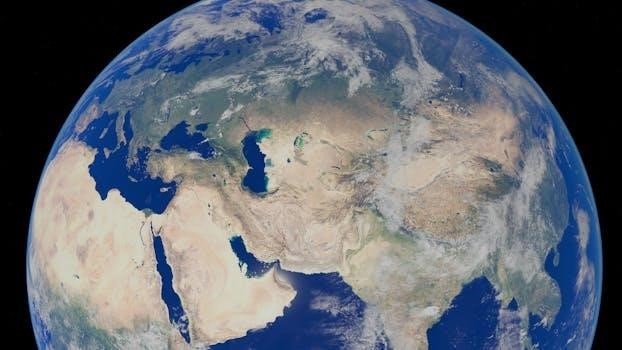The book, “The First Global Revolution,” is a report that was crafted by Alexander King and Bertrand Schneider. It was published in 1991.
“The First Global Revolution⁚ A Report by the Council of the Club of Rome” emerged in 1991, authored by Alexander King and Bertrand Schneider.
Published by Pantheon Books, this book offers both a warning and a potential approach to resolving critical global issues.
It addresses a world facing depleted fuel supplies, massive population growth, and the looming threat of global climate change.
These challenges, compounded by growing water shortages and international lawlessness, are portrayed as being on a collision course with potentially
catastrophic consequences. The book investigates the long-term continuity of large-scale states and empires, and its effect on the Near Easts social fabric,
including the fundamental.
King and Schneider delve into the growing interdependence between nations within a single planetary system.
They advocate for adopting a global perspective when tackling complex problems, emphasizing the need for long-term strategies beyond the scope
of immediate governmental concerns.
Authors⁚ Alexander King and Bertrand Schneider
Alexander King and Bertrand Schneider are the authors of “The First Global Revolution⁚ A Report by the Council of the Club of Rome.”
King served as President Emeritus of the Club of Rome, while Schneider held the position of Secretary General.
Their combined expertise and leadership within this influential organization provided the foundation for this insightful work.
The Club of Rome is known for commissioning the study, “The Limits to Growth”. The study was accomplished by an international team of professors and
researchers at MIT using the system dynamics methodology of Jay Forrester. This was a pioneering.
King and Schneider brought a wealth of knowledge and experience to the analysis of global challenges.
Their collaboration aimed to offer both a stark warning about the perilous state of the world and a set of potential solutions for a more sustainable future.
Their backgrounds equipped them to address the complex issues of interdependence, resource depletion, and the need for a global approach to problem-solving.

The First Global Revolution⁚ An Overview
Publication Year⁚ 1991
“The First Global Revolution⁚ A Report by the Council of the Club of Rome” was published in 1991, marking a significant moment in the discourse on global
challenges and potential solutions. This was during a transitional period. It also marked the end as well as the zenith of the long postwar period of rapid
economic growth in the industrialized countries.
Published by Pantheon Books, the book emerged as a blueprint for the 21st century. The report by the Club of Rome set forth a strategy for world survival
at the onset of the first global revolution. The book addressed the interconnectedness of nations within a single planetary system.
It also focused on issues and policies and options in a longer term perspective than is possible for governments, which respond to the immediate concerns.
The timing of its release coincided with a growing awareness of environmental degradation, resource depletion, and the increasing interconnectedness of global
economies. The book aimed to offer insights and recommendations for navigating the complex problems facing humanity at the close of the 20th century.

Key Themes and Concepts
This book covers topics including the need for the world to convert from a military to a civil economy, and it recognizes the disastrous short-term effects.
Global Interdependence
The book emphasizes global interdependence, highlighting how nations are increasingly interconnected within a single planetary system. It focuses on issues, policies, and options, taking a longer-term perspective than governments typically do, as governments often respond to immediate concerns.
“The First Global Revolution” underscores the growing interdependence between nations. It addresses the vast and complex problems of the world, advocating for a global approach to tackle these issues.
The report analyzes the interconnectedness of global systems, emphasizing that problems like climate change, poverty, and resource depletion require collaborative international solutions. It explores how economic, social, and environmental factors are intertwined on a global scale. The book also suggests that only a globally coordinated response can tackle these problems effectively.
Civilization Crises
The book, “The First Global Revolution,” addresses various civilization crises that pose significant threats to humanity’s future. These crises include issues such as depleted fuel supplies, massive population growth, and widespread poverty. Global climate change, famine, and growing water shortages are also highlighted as critical challenges.
These issues, according to the report, are on a collision course with potentially catastrophic consequences for global society. The authors stress the urgency of addressing these interconnected crises to prevent a collapse of civilization as we know it.
The analysis also includes the examination of how international lawlessness exacerbates these problems, creating a complex web of challenges that demand immediate and comprehensive attention from global leaders and policymakers. The book serves as both a warning and a call to action.
Need for Sustainable Development
“The First Global Revolution” emphasizes the critical need for sustainable development as a solution to the various global crises outlined in the book. The authors argue that traditional models of economic growth are unsustainable and contribute to the depletion of resources, environmental degradation, and social inequality.
Sustainable development, in this context, means meeting the needs of the present without compromising the ability of future generations to meet their own needs. This approach requires a shift in mindset and practices across various sectors, including energy, agriculture, and industry.
The book advocates for policies that promote resource efficiency, reduce pollution, and ensure equitable access to essential resources. Transitioning to a sustainable path is essential for long-term survival and stability, requiring international cooperation and innovative solutions.

Problems Addressed
“The First Global Revolution” addresses critical problems, including depleted fuel supplies, massive population growth, global climate change, and growing water shortages, all with potentially catastrophic consequences globally.
Depleted Fuel Supplies
“The First Global Revolution” highlights the concerning issue of depleted fuel supplies, recognizing its potential to trigger a global crisis. The book emphasizes that the unsustainable consumption of fossil fuels is rapidly exhausting reserves, posing a significant threat to energy security and economic stability worldwide.
King and Schneider pointed out that over-reliance on non-renewable sources would have serious consequences. This includes increased geopolitical tensions, economic instability, and environmental degradation. The dwindling availability of fuel resources could lead to conflicts over access, as nations compete for limited supplies.
Furthermore, the authors warned of the environmental impact of continued fossil fuel use, contributing to air pollution and global climate change. Transitioning to sustainable energy sources is presented as a necessity for long-term stability. “The First Global Revolution” advocated for a shift toward renewable energy technologies. This reduces dependence on finite resources.
Massive Population Growth
“The First Global Revolution” addresses the escalating challenge of massive population growth, portraying it as a critical factor exacerbating global problems. The book underscores that the rapid increase in human population places immense strain on Earth’s resources, intensifying issues related to food security, water availability, and environmental degradation.
King and Schneider highlight the potential for widespread poverty and social unrest as population growth outpaces the capacity to provide basic necessities. They suggest that densely populated areas are particularly vulnerable to resource scarcity and environmental disasters, leading to increased competition and displacement.
The authors stress the need for sustainable development strategies that can accommodate population growth while minimizing negative impacts on the planet. This involves investing in education, healthcare, and family planning programs to empower individuals and promote responsible population management. “The First Global Revolution” advocated for global cooperation to address the challenges posed by rapid population expansion.
Global Climate Change
In “The First Global Revolution,” global climate change is presented as a paramount threat, poised to trigger catastrophic consequences worldwide. The authors, King and Schneider, emphasize the urgency of addressing this issue, highlighting the potential for rising sea levels, extreme weather events, and disruptions to ecosystems.
The book connects climate change to human activities, particularly the burning of fossil fuels and deforestation, which release greenhouse gases into the atmosphere. These gases trap heat, leading to a gradual warming of the planet and altering established weather patterns. The authors caution that inaction will result in irreversible damage to the environment.
“The First Global Revolution” stresses the need for a global response to mitigate climate change, advocating for international cooperation to reduce emissions and transition to renewable energy sources. The authors suggest that technological innovation and policy changes are essential for achieving sustainable development and preventing the most severe impacts of climate change.
Growing Water Shortages
“The First Global Revolution” identifies growing water shortages as a critical global challenge. The authors, King and Schneider, emphasize that access to clean and sufficient water is fundamental for human survival and societal well-being. They highlight the increasing strain on water resources due to population growth, industrialization, and unsustainable agricultural practices.
The book explains that water scarcity is not just an environmental problem but also a social and economic one, exacerbating poverty, inequality, and conflicts. The authors point out that many regions face water stress due to over-extraction, pollution, and climate change, which alters rainfall patterns and increases evaporation rates.
“The First Global Revolution” advocates for integrated water resource management, promoting efficient irrigation techniques, wastewater treatment, and conservation measures. The authors stress the need for international cooperation to share water resources equitably and develop sustainable water policies. They argue that addressing water shortages is essential for preventing humanitarian crises and ensuring a sustainable future.

Proposed Solutions and Strategies
“The First Global Revolution” suggests transitioning from military to civil economies. It also advocates adopting a global approach to address complex global challenges. This includes focusing on long-term policies for governments.
Transition from Military to Civil Economy
In “The First Global Revolution,” Alexander King and Bertrand Schneider emphasize the critical need for the world to transition from a military-focused economy to one centered on civil development. This shift involves reallocating resources and investments from military spending to sectors like education, healthcare, and sustainable infrastructure.
The authors argue that a military-driven economy perpetuates conflict and diverts resources from addressing pressing global issues such as poverty, environmental degradation, and social inequality. By redirecting these resources, nations can foster economic growth, improve living standards, and promote peace and stability.
This transition also entails fostering international cooperation and disarmament efforts. Reducing military spending can free up funds for investment in renewable energy, sustainable agriculture, and other initiatives that promote long-term sustainability. The book highlights that this transition is essential for creating a more just and equitable world.
Adopting a Global Approach
In “The First Global Revolution,” King and Schneider advocate for adopting a global approach to address the complex, interconnected problems facing humanity. This approach recognizes the interdependence of nations within a single planetary system, requiring international cooperation and coordinated efforts to find viable solutions.
The authors emphasize that issues like climate change, resource depletion, and economic instability transcend national borders and cannot be effectively resolved by individual countries acting in isolation. A global perspective is essential for understanding the root causes of these problems and developing comprehensive strategies to mitigate their impacts.
This involves fostering dialogue, sharing knowledge, and establishing collaborative frameworks among nations, international organizations, and civil society groups. By working together, the world can leverage diverse perspectives, resources, and expertise to create a more sustainable and equitable future for all. This unified effort is crucial for navigating the challenges of the 21st century.
